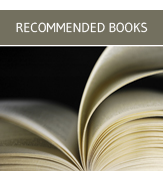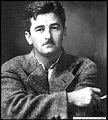Series Spotlight: Writers in Their Time
If you are curious about how the well-established writers of past centuries were viewed during their own era—before canonization, reputation, critical theory, and passing years had an influence—the Library’s collection has you covered. There are scholarly series of books in our stacks devoted to expertly compiling the immediate critical reception of now-famous works and the private and public impressions authors made upon their peers. Illuminating and occasionally surprising, these books are indispensable for the serious researcher and provide fascinating browsing material for the devoted literature enthusiast.
American Critical Archives, published by Cambridge University Press, contains “full reviews and excerpts from reviews that appeared in newspapers and weekly and monthly periodicals, generally within a few months of the publication of the work concerned.” The Library has 13 volumes in this series, including William Faulkner, Herman Melville, Willa Cather, Flannery O’Connor, and Henry James, available on stack 9. These are formidable collections, most in the 400- 700 page range, and include introductory essays by specialists. Citations for additional reviews are included for all works.
Moby Dick
“…so much trash belonging to the worst school of Bedlam literature…[Melville] seems not so much unable to learn as disdainful of learning the craft of an artist.” —October 25, 1851, The Athenaeum [London]
“…few books which professedly deal in metaphysics, or claim the parentage of the muses, contain as much true philosophy and as much genuine poetry…” —October 25, 1851, John Bull [London]
Routledge’s The Critical Heritage series gathers contemporary responses to a writer's work, ranging from essays to journalism and contemporary opinion, as well as documentary material such as letters and diaries. Criticism included from later periods “demonstrate the fluctuations in an author's reputation.” Useful, lengthy introductions provide context and analysis of the material included in each volume. Some 19th century novels were published in installments and reviewed in newspapers and weeklies as they appeared. Critical Heritage occasionally reprints the series of reviews so readers can witness the attitude of a critic change as the novel unfolds. The Library has nearly 60 volumes in this series, ranging from Chaucer to to Anthony Trollope to D.H. Lawrence, housed in stack 9.
Washington Square
“If any of our more penetrating readers can say what Mr. Henry James’s last story amounts to, we shall be happy to publish the estimate…The truest thing we can say of Washington Square is that it is a piece of literary dilettantism. It does not give Henry James credit for being even an earnest trifler.” —January 1881, The Literary World [Boston]
Writers In their Own Time, a series edited by Joel Myerson and published by the University of Iowa Press, compiles “first-hand accounts—published and unpublished, adulatory and critical—written by both famous and forgotten contemporaries.” The series emphasizes 19th century American writers, and the Library owns about a dozen volumes in the series—Margaret Fuller, Ralph Waldo Emerson, Nathaniel Hawthorne, Herman Melville, Emily Dickinson, and more.
“Emily is called in Amherst “the myth.” She has not been out of the house in fifteen years. One inevitably thinks of Miss Haversham in speaking of her. She writes the strangest poems and very remarkable ones. She is many respects a genius. She wears always white and has her hair arranged as was the fashion fifteen years ago when she went into retirement. She wanted me to come and sing to her but she would not see me…When I stopped Emily sent me a glass of rich sherry and a poem written as I sang.” –Mabel Loomis Todd journal entry, September, 1882 (from Emily Dickinson In Her Own Time)
Book Review Digest is a long-running annual published by H.W. Wilson and a staple of library reference collections. The Society Library’s holdings go back to 1905 and run through the current year. Each volume provides excerpts from, and citations to, book reviews. If you want a general sense of how The Great Gatsby was received upon its release, for example, pull the 1925 volume and you will find several excerpts and citations from reviews, including the Springfield Republican’s assessment that The Great Gatsby “falls into the class of negligible novels.”
Huckleberry Finn
“But what can be said of a man of Mr. Clemens’s wit, ability and position deliberately imposing upon an unoffending public a piece of careless hack-work in which a few good things are dropped amid a mass of rubbish…” —March 2, 1885, New York World
“…it is doubtful if the edition could be disposed of to people of average intellect by anything short of the point of the bayonet…singularly flat, stale, and unprofitable.” —March 5, 1885, Boston Evening Traveller
And, finally, if you are interested in digging deeper for old book reviews, be sure to check our Electronic Resources page. Library members have access to many searchable archival databases, such the TLS archive (coverage: 1902-2012), Proquest Historical Newspapers (including: The New York Times, 1851-current; New York Tribune / Herald Tribune, 1841-1962; The Los Angeles Times, 1881-1991; The Wall Street Journal, 1889-1997; The Washington Post, 1877-1998; and The Christian Science Monitor, 1908-2001), The New York Review of Books (1963-current), Book Review Index Plus (coverage back to 1965), and the London Review of Books.
The Sound and the Fury“I can’t for the life of me understand why so able a story teller will waste so much ingenuity and time trying to make a fine story a puzzle and a burden.” —October 4, 1929, Philadelphia Public Ledger
“…one of the finest works in the tragic mood yet to appear in America…[Faulkner] is the only American who seems capable of rivaling James Joyce… a finer work of art [than Ulyssess].” —June 29, 1930, New Orleans Times-Picayune
Further reading: See our series spotlight on interviews with authors (and more).



